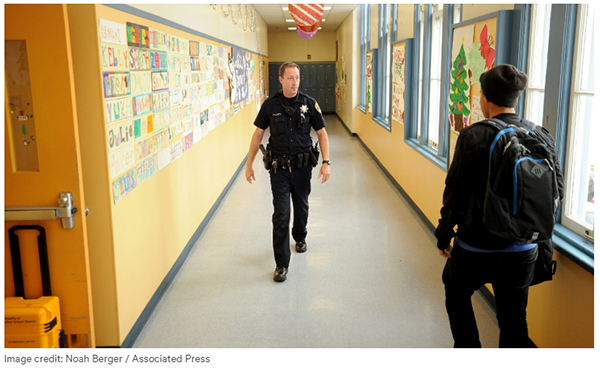School Policing Remains Disturbingly Punitive in Texas, Despite Progress
On December 15th, 2016, Texas Appleseed and Texans Care for Children released Dangerous Discipline: How Texas schools are relying on law enforcement, courts, and juvenile probation to discipline students. Data in the report show that students in Texas schools are arrested, sent to adult criminal courts, referred to juvenile probation, and experience use of force incidents at alarming rates, often for relatively minor misbehaviors. Meanwhile, the budget for school security services is often many multiples of any social work and guidance counselor funding. These punitive discipline methods are disproportionately used against Black and Latino students and youth with disabilities even though students of color are no more likely to misbehave, and students with disabilities should be receiving supports from their schools.
Class C Ticketing
School police frequently issue Class C misdemeanors for minor misbehavior, often labeled “disorderly conduct.” Being charged with a Class C misdemeanor can mean an appointment in court, a criminal record, and fines up to $500, all of which can have a significant impact on a student’s immediate circumstances and long-term prospects. Dangerous Discipline tracks Class C tickets, complaints, arrests, and use of force incidents (i.e., use of Tasers, pepper spray and open hand control on students) from school years 2011 to 2015 and school-based juvenile probation referrals in calendar year 2015.
The report builds on the work Texas Appleseed has conducted for several years. In 2013, we supported legislation that outlawed the use of Class C tickets for the frequently-charged offenses of Disruption of Class and Disruption of Transportation. In just one school year, the 2013 reforms resulted in a more than 50 percent reduction in charges issued to Texas students in schools where we were able to track data over the entire period. However, the initial reduction in ticketing has since largely plateaued. Thousands of complaints are still issued by districts and school police officers for Class C misdemeanor offenses every year, most involving classroom misbehavior or other relatively minor conduct.

Youth Perceptions of School Policing
Dangerous Discipline also features an analysis of school policing perceptions and experiences by youth. Texas Appleseed designed and administered the school policing survey to 425 youth incarcerated in secure juvenile facilities run by the Texas Juvenile Justice Department across the state. In the surveys, youth reported interactions that they and their peers had with police officers in their schools prior to incarceration, and how those interactions impacted school climate and the youths’ future expectations of interactions with police officers. The survey found that over 60 percent of participants had been stopped, questioned by a school police officer, or sent to court by an officer or other school district official at least once, and 35 percent had been arrested at school before entering the juvenile facility. A majority of youth reported having been disciplined by a school police officer for minor, non-violent behavior and a majority reported having mostly negative experiences with officers.
Other Key Report Findings
- Black students are over-represented in arrests, court referrals, and use of force incidents, despite research showing they are no more likely to misbehave than their peers.
- Students who receive special education services are over-represented.
- Texas school districts appear to spend more on police officers than counselors.
- Black students are over-represented in school-based referrals to juvenile probation.
- Latino youth are over-represented in school-based referrals to juvenile probation.
- Boys were over-represented in tickets/complaints, arrests, and use of force incidents at schools.
Although the data are disturbing, Dangerous Discipline has the potential to educate lawmakers, school district leaders, and the public about the need to change the role of school police on Texas campuses. Read the full report here.
Reports like this provide the powerful evidence we need to balance the scales of justice. This report will not just sit on a shelf – it will provide the up to date data, broken down by region and city, that we can use as we visit school board trustees, Texas lawmakers, and other policy makers to ask for change. We need your support to continue this vital work of dismantling Texas’ school-to-prison pipeline – please donate today!
This post is part of Texas Appleseed’s 20th anniversary celebration. Between now and the end of December, we’re celebrating 20 of our proudest accomplishments. Learn about the rest of our work here and on social media.

